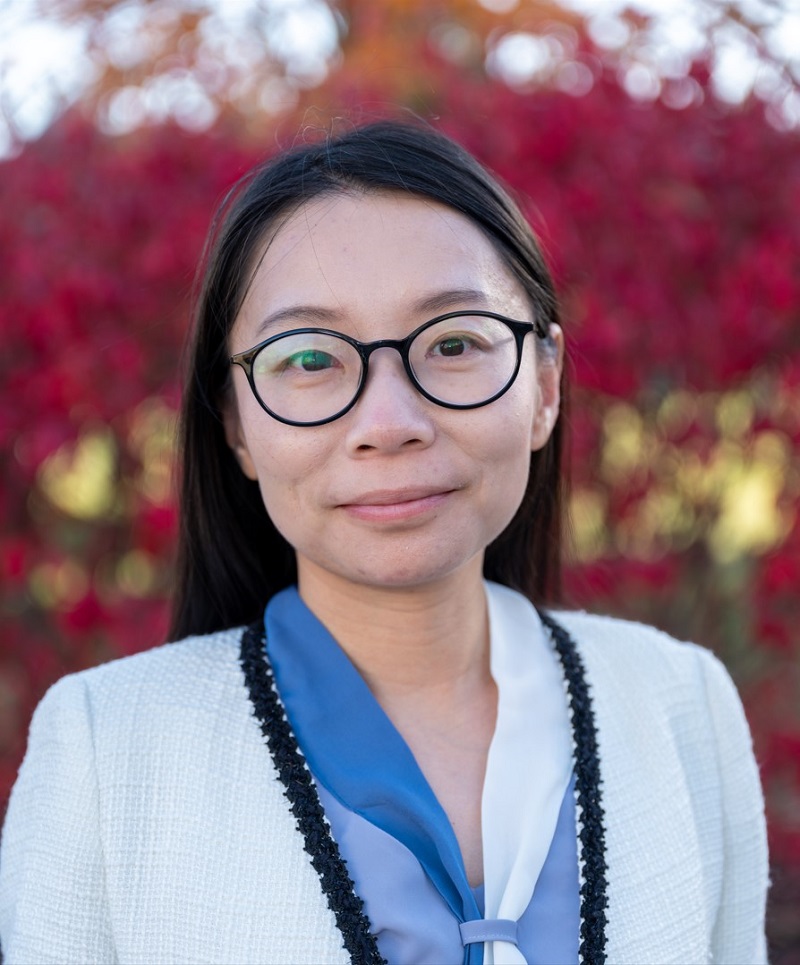GET TO KNOW OUR FACULTY & THEIR WORK
Dr. Yiwei Zhang | Grace Abbott School of Social Work

Dr. Yiwei Zhang is an assistant professor at the Grace Abbott School of Social Work whose work focuses on advancing children’s human rights and well-being. Her research centers on understanding children’s experiences from their own perspectives, with particular attention to children in immigrant families and children with Autism Spectrum Disorder. Grounded in a rights-based approach, Dr. Zhang examines how family, community, and social contexts shape children’s well-being. She also brings her human rights commitment into the classroom through hands-on, community-engaged teaching.
With support from GCHR, Dr. Zhang led a service-learning project last year that connected social work students with refugee- and immigrant-serving organizations, integrating program evaluation with hands-on learning about culturally responsive practice and human rights.
Previous Spotlights
Associate Director Dr. Paul Williams facilitated two workshops in the Equator Province of Democratic Republic of Congo in January 2025. He was humbled to watch over 80 healers who work daily to minimize human suffering and death from preventable diseases - doctors and nurses, pastors and priests, herbalists and spiritual healers - gather for training sessions to learn how to recognize and respond to emerging epidemic disease in remote towns in the tropical rain forest of central Africa.
In two 2-day workshops, Williams and his Congolese colleagues invited healers who work with patients dying of cholera, Ebola, Mpox, yellow fever, and other diseases to study together and exchange ideas about epidemic prevention and mitigation.
"Physicians and nurses told me that no one had ever gathered diverse healers to recognize their shared passion to reduce morbidity and mortality," Williams said while reflecting on his experience. "Thank you to the Goldstein family and others for their generosity to support the right to healthcare in an under-resourced society!"
By the end of February 2025, participants identified 22 suspect cases:17 with Mpox symptoms, 2 possible Ebola, 1 yellow fever, and 1 rabies case. Additional outcomes include a complete translation of training materials from French to Lingala, a language more accessible to village healers.
Dr. Martina Saltamacchia, typically teaches incarcerated people at the Omaha Correctional Center (OCC) every other year. This year, she completed a 40+ hour online training on the Inside-Out Pegagogy, becoming a certified Inside-Out instructor with the ability to implement this pedagogy to all the courses she regularly teaches at OCC.
Although education is recognized as a fundamental human right for everyone, it remains largely elusive for incarcerated people. The Inside-Out Exchange Program is an educational program with an innovative pedagogical approach tailored to facilitate dialogue across difference by bringing together campus-based students with incarcerated students for a semester-long course held in prison. Their praxis is grounded in the belief that our society is strengthened when higher education and learning is made widely accessible and, at the same time, when it allows participants to encounter each other as equals, often across profound social barriers.
Dr. Saltamacchia was extremely grateful for the experience. "In this intensive training, being tutored by formerly incarcerated individuals and collaborating with enthusiastic educators from around the country was a truly humbling experience. The stories, the hope, and the shared reflections renewed my passion for education within the criminal justice system, reaffirming its transformative power."
Dr. Saltamacchia serves on the Goldstein Center Executive Committee, as the Director of UNO Medieval and Renaissance Studies, and the History Graduate Program Chair.
Dr. Debora Wisneski’s research, service, and teaching all are guided by the rights and well-being of children. Her research interests focus on understanding the barriers to children’s right to play in education settings and teacher development and leadership that promotes children’s human dignity. She teaches coursework in Play in Education, Leadership in Early Childhood Education, and Guidance of Young Children.
Dr. Wisneski is the past-president of the Association for Childhood Education International (ACEI) and the Association for the Study of Play (TASP). She currently serves on the Board of Directors of Educare of Omaha, Education Rights Counsel, Why Arts, The Rose Theater, and Spielbound.
Military courts are a common feature of national judicial systems around the world. Militaries operate their own judicial systems to prosecute service members for a narrow range of military offenses, such as insubordination, that are not covered by the civilian legal system. Yet, when military personnel commit human rights violations, this parallel legal system in which a military is able to sit in judgment of its own actions challenges the rule of law and allows for potential impunity. In short, when military courts overstep their boundaries, victims do not receive justice, future human rights violations are not deterred, and civilian control of the armed forces and democracy are weakened.
Scholars and practitioners recognize that the transfer of human rights cases to civilian courts is a necessary first step in holding human rights violators accountable. In a new book, Military Courts, Civil-Military Relations, and the Legal Battle for Democracy: The Politics of Military Justice, Dr. Brett J. Kyle (University of Nebraska Omaha) and Andrew G. Reiter (Mount Holyoke), employ a new innovative framework of legal subordination of the armed forces to examine the political role of military courts.
The project develops the first comprehensive record of militaries’ judicial powers and practices regarding accountability for human rights abuses. It further explains processes of reform of military court jurisdiction offering potential to inform human rights activism in this important domain by explaining existing cases of success and failure, as well as risks involved with different reform strategies.